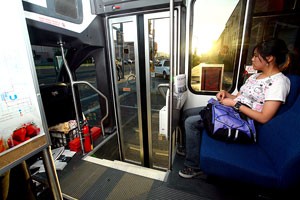The UA’s Parking and Transportation Services is trying to reduce more than just parking spaces.
Public transportation is one of many ways to combat the global issue of air pollution, and many PTS programs were created with that very principle in mind.
PTS began purchasing diesel-compatible buses for its CatTran shuttle service in 2004, but it wasn’t until January 2007 that the buses started using bio-diesel for fuel.
PTS would have switched to bio-diesel earlier but there wasn’t any fuel available close to its shuttle compound, said PTS associate director David Heineking, adding that now it has an agreement with the city to use its supply.
In the year after the switch from diesel to bio-diesel, CatTran carbon dioxide emissions fell by over six tons, said Bill Davidson, marketing specialist for PTS.
“”We switched to bio-diesel because it’s better for the environment,”” Heineking said. “”Air quality is an issue in Arizona and Tucson, and we wanted to make sure we were doing our part.””
As PTS doesn’t get any funding directly from the state, most of their programs and vehicles are funded by parking permits that students purchase, he said.
That money also goes toward the purchasing of the bio-diesel for the CatTran vehicles, a price comparable to that of gasoline, he said.
A majority of the CatTran shuttles run on bio-diesel, and the remaining gasoline buses are projected to be replaced with bio-diesel vehicles within the next three years, Davidson and Heineking said. The next purchase will come this fall of this year.
CatTran gave rides to approximately 504,000 members of the campus community last year, according to PTS data.
PTS also has a fleet of 22 electric-powered golf carts, meaning 42 percent of its vehicles are powered by electricity, Davidson said. The golf carts are used for the Cart Service and the emergency road service.
The Cart Service provides free rides to UA students and faculty who are temporarily or permanently injured and can be used by filling out a form found at Campus Health Service.
The emergency road service provides assistance to drivers in distress by offering roadside maintenance for vehicles on campus. Services include jump-starts, flat-tire care and unlocking vehicles.
PTS also has programs that encourage environmentally sound practices.
It offers reduced-priced parking permits for UA students or employees who carpool to campus. Currently, only vehicles transporting groups of three or more are eligible for the permits, though PTS is working on reducing the limit to two people, Davidson said.
Last year, 5,315 people carpooled to campus, saving almost 1.2 million trips to campus and reducing carbon dioxide emissions by 18,820 tons, according to PTS data. Individuals who carpooled were reported to save as much as $4,000 in gas each year.
Ground-level parking permits for carpool vehicles are available for $139 and garage parking for $172 per person.
PTS also offers a free RideShare service to help students locate nearby carpoolers, as well as free permits for vehicles transporting five to 14 people, otherwise known as vanpools.
Vanpool and carpool parking spots are reserved in both garages and surface parking lots.
Another reduced-priced public transit program is the U-Pass, a bus pass for the Sun Tran sold at a lower rate to UA students and employees. Last year, PTS paid nearly $178,000 to cover more than 50 percent of each U-Pass purchased.
PTS is also responsible for coordinating and supplying bike racks on campus. There are currently 11,000 free spaces.
Employee use of alternative transportation programs at the UA reduced emission pollution last year by 219,100 pounds, according to Pima Association of Governments calculations for the 2007 Annual Travel Demand Survey.
The survey showed that 383,425 gallons of gasoline and nearly 7.7 million miles were also saved.
Since 2003, PTS has been deemed by the Environmental Protection Agency a Best Workplaces for Commuters Employer.









